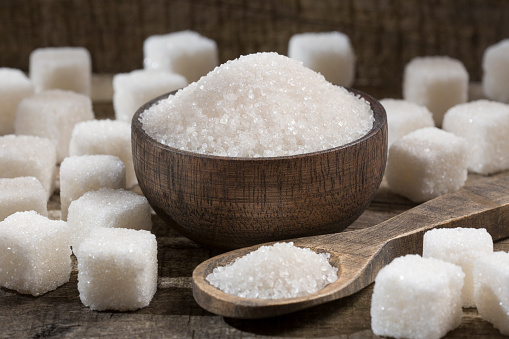What is sugar?
What is sugar: Sugar
is a natural ingredient that has been a part of our diet for thousands of
years. Sugars are store in our body as form energy. Sugar and starch are
converted into glucose in the stomach and intestines.
Glucose is an important source of energy for the brain and
is essential for the normal functioning of the human body. Our brain alone uses
about 130 grams of glucose per day.
Sugar is naturally present in various foods. These are
especially found in fruits, vegetables, milk, etc. The added sugars are the
sugars that manufacturers use during the production and preparation of certain
food products.
The body separates these different types of sugars types and does not treat them the
same. For example, the sugar in bananas will not be processed in the same
amount as white sugar contains one sugar. There are different types of sugar.
Here are the most common types of sugar:
Here are the most
common types of sugar:
- Glucose: Fruits, vegetables, honey, table sugar, dairy foods, cereals.
- Fructose: Fruits, vegetables, honey
- Galactose: Dairy
- Lactose: Dairy
- Sucrose: Fruits, vegetables, table sugar, honey
- Maltose: Malt, specific cereal
How many calories does sugar have?
How many calories
does sugar have: Sugar is a carbohydrate
and as such, it provides 4 calories (kcal) per gram.
For example, an envelope
of 10 grams of sugar provides 40 kcal.
In reality, its caloric content is not very high, as it does
not reach the fatty half, or even 9 calories per gram.
But sugar "Makes
you fat" because most of what we usually use comes from industrial
products (pastries, pre-cooked dishes, etc.), which are high in fat and high in
calories. Natural foods do not contain half the sugar of processed foods.
Manufactured products are always more likely to contain refined ingredients and added sugars. So, try to eat at least 5
fruits and vegetables a day, as they provide nutrients, fiber and antioxidants
that protect against disease.
How much sugar in a day?
How much sugar in a
day: It’s a common question of many patients and also common people that how many grams of sugar can we take per
day? /How much sugar in a day?
The body uses glucose as fuel, but this does not mean that
the only source should be white sugar.
Sugar is not essential from a nutritional point of view. Our
daily costs are much higher than the WHO
recommendations. The WHO recommends eating less than 25 grams of sugar (added
to products) per day,
Overuse of sugar can provide unnecessary calories and
promote obesity, diabetes, cavities, and cardiovascular
disease. Also, The WHO recommends reducing the daily energy intake of added
sugars by less than 10% and states that it is better not to exceed 5%.
Don't confuse "slow"
or “complex” carbohydrates, which
must consist of 55% to 60% of our energy intake, including
"fast" or “common” sugars (glucose, fructose,
galactose, maltose, lactose, sucrose ...), including sweet taste. And which in
turn should be eaten in very small quantities. Described as an “empty calorie”, sugar is not necessary
for nutrition, even if it is a source of pleasure.
So now you can understand How
much sugar in a day you can take. We careful about the caution of sugar beverages.
How much sugar per day to lose weight?
How much sugar in a day to weight loss:
How much sugar should
you take per day to lose weight or obesity? When you need to lose weight or
when you take care of your health, it is best to avoid “Added sugars” as much as possible.
Indeed, sugar leads to excessive consideration. Consumption
of processed carbohydrates (free sugar) increases the risk of obesity and harms
health.
Even the supermarket foods that we present as dietetics can
be full of added sugar (56% of supermarket foods contain added sugar).
Many overweight or obese people are addicted to sugar. Opium has the same effect as sugar or sugar-rich
products. It affects the activity of dopamine in the reward center of the
brain.
Sugar had no long-term effects on the brain (like some
drugs) but has an additive effect (source). This is why it is possible for
someone to lose control of the sugaring service. Just as smokers should avoid
cigarettes, a sugar addict should avoid added sugars as much as possible.
It is most important to limit your sugar intake. Foods that
contain free sugary foods should be avoided. Soft drinks, fruit juices,
fries, sauces, soups, toast, etc. should not be part of your
diet if you want to lose weight.
If you want to lose weight, avoid foods high in sugar, and
opt for uncooked foods. These are often composed of one material.
For true sugar addicts, total avoidance is the only reliable
way to overcome addiction and reduce excess fat.
Types of Sugar in foods:
Types of Sugar in
food: Sugar is a type of carbohydrate that the body uses to produce energy.
It can be present in food in two different ways:
- High sugar foods
(added sugars): Monosaccharides (glucose,
fructose) and disaccharides (sucrose
or table sugar) added to foods and beverages by manufacturers or consumers,
as well as honey, syrup, fruit juice or nectar.
- Underlying sugars:
These are found in whole fresh fruits and vegetables. There is no evidence that
this type of sugar in foods has
harmful health effects.
Sugar is often added to improve the taste of food but helps
keep them (jams and jellies) and maintain their acidity (vinegar or tomato)
balance. However, these types of sugar in
foods can do the most damage.
Nutrition labeling:
Why nutrition
labeling? And why nutrition labeling
is important?
According to the Spanish Society of Endocrinology andNutrition (SEN), it is important to read the nutrition label, in the
carbohydrate category and internally, there are free or added sugars that
should be avoided.
So, it is better to focus mainly on salad dressings, sauces,
breakfast cereals, and vegetable milk. As the elements appear in ascending
order, it must be said that the maximum ratio is indicated first.
Sugar has more than 600 different names: corn syrup, beet syrup, coconut syrup,
agave syrup, Panella, fructose, barley malt, brown sugar, carob, or beet sugar, etc. In addition, the
ending terms of the "courage"
suffix are usually "hidden"
sugars, such as sucrose, glucose, dextrose, fructose, or lactose.
How does sugar affect the body?
How does sugar affect
the body: Does too much sugar affects your body? It’s a normal question for us. The body
produces insulin to control sugar levels and prevent cell damage which can lead
to hyperglycemia? When cells receive insulin, they remove sugar from the blood
and store it as body fat.
When you take in too much sugar, insulin levels rise very
quickly. Inevitably, this effect causes the cells to not respond to this
hormone in the long run, resulting in insulin resistance. This metabolic disorder is involved in the
development of diseases such as obesity and type-2 diabetes.
How does sugar affect the body?
A high intake of added sugars is associated with a risk of cardiovascular and respiratory diseases, among other problems like:
Weight gain: Adding sugar to foods and drinks makes them more caloric. The food is easy to sweeten, taking in extra calories.
Triglyceride growth: Triglycerides are a type of fat found in blood and fatty tissues. Taking a high amount of added sugar can increase your sugar levels and therefore increase the risk of heart disease.
Dental caries: Cavities are the spread of cariogenic bacteria that multiply after you eat large amounts of sugar (juices, sweets, cookies, etc.).
How to reduce sugar in the diet?
How to
reduce sugar in the diet?
Take natural
and added sugars: It is important to distinguish between sugars in
foods such as fruits and vegetables and naturally occurring sugars. The best
way to significantly reduce your sugar intake is to avoid sugars as much as
possible. This method is effective and fairly simple.
For example, fruits do contain fructose but their intake is
not a problem because in their natural form they contain fiber, minerals, vitamins, and antioxidants.
Fiber slows down the passage of sugar through the blood. The
advantage is that the amount of sugar in the blood rises very quickly. Fructose
sends a signal of satisfaction to the brain to let it know that it is time to
stop eating. It is the fibers that provide a feeling of satisfaction.
Also, in some studies, participants served 20 fruits per day
for several weeks or months without gaining weight. In short, even if we want
to lose weight, fruits have a place in our diet.
It is also interesting to note that processed foods often
contain low levels of sugar. These are devoid of the essential fatty acids that
our bodies need for proper balance.
Here are some tips to get low (added) sugars:
- Always read the label at the supermarket.
- Don't be fooled by different names of sugar.
- The most abundant ingredient in a product should be listed on the label first.
- Avoid products that contain sugar in the first three ingredients.
- Don't buy more than one type of sugary product.
How to reduce sugar in the diet:
Eliminate sugarily products: Avoid the most obvious sources of sugar such as cakes, medallions, sweets, soft drinks, and juices. Replace sugary drinks with sugar-free herbal tea, sugar-free coffee or mineral water.
Check labels: Make your purchase, check all products labels and add a quantity Add For example, 330 ml of fruit juice contains 30.1 grams of sugar (7.7 pieces) in a brick.
Take the whole products: Common sugars (white flour, white pasta, and white rice) can be quickly broken down into body sugar. Replace them with full, healthy, saturated, and high fiber versions.
Brown sugar is also not healthy: sugar is basically a mixture of sucrose, sugarcane or beets. White sugar is made up of almost complete sucrose. Brown sugar contains 85% sucrose, water, and very small amounts of minerals.
Avoid synthetic sugars: xylitol, mannitol, sorbitol, aspartame, cyclamates or saccharin are a few calorie sweet but very sweet. These are useful alternatives for people with diabetes, but they make us addicted to sweet taste.
Sugar-free: Replace sugar with herbal and sweet spices like cinnamon, nutmeg, cardamom, vanilla, anise ... You can use dates, apricots, dried plums, Komet, apples, etc. to sweeten your yogurt or smoothie.
Eat more fruits: Fruits are not considered as added sugar. Besides, they are very healthy when eaten whole. This does not apply to juice. Thus, the juice is never a fruit instead.
You see that experts encourage us to follow a more natural
and traditional diet based on fresh and natural foods and to limit more sweet
and high-calorie processed products that can harm our health.
Surprisingly there are 6 foods rich in sugar:
Foods rich in sugar:
You may find that eating too much sugar is bad for your
health. Many people try to reduce their sugar intake but do not know how much
the sugar they are consuming each day.
One reason for this is that in all foods you should not
suspect that added sugars actually contain hidden sugars. Even our foods that
are sold as "light” often contain more sugar than regular foods.
Reducing the amount of sugar in your diet is not as
difficult as you might think, but if you are addicted to sugar, you need to be
disciplined to change your diet. The
best way to avoid added sugars is to cook your own meals. This will let you
know what's right inside.
If you still choose ready-to-eat foods, make sure the labels
do not contain added sugar.
To help you get
started, here are 6 foods that are high in sugar:
1: Canned soup:
Supermarket shelves serve a variety of canned soups. We
often think that they are full of good things. Some vegetables, some water ...
these soups are probably dietetic, aren't they? Okay, it’s just the opposite. Canned
soups contain many additives, including sugar.
Can you eat canned soup? In this case, first check the list
of ingredients. If you see different pseudonyms of sugar like sucrose, glucose-fructose syrup, barley malt, dextrose, maltose etc.
The ingredients present in large quantities appear at the
top of the list. Also, if the label indicates the presence of sugar in a few
pseudonyms, it probably contains a lot of sugar.
2: Sports drinks / practice drinks:
Vitamin Water It is often mistakenly believed that sports
drinks like Vitamin Water, Gatorade or Isoster are good for health.
However, these drinks contain a lot of added sugars which
are quickly absorbed by the body.
The sugars most often
used in these sports drinks are:
- Sucrose
- Glucose
- Maltodextrin
- Fructose
A standard sports drink can contain up to 32 grams of added
sugar. It is equivalent to 8 teaspoons of sugar (source).
Sports drinks can be effective for trained athletes during
long-term intensive efforts. If you are not a professional athlete, I strongly
advise you against these calorie bombs which have no benefits for your health.
3: Chocolate:
Chocolate milk, hot chocolate is delicious! But is it good
for your health? All right, not all right. Chocolate milk is made with milk,
cocoa and is that foods rich in sugar.
One glass of chocolate milk contains about 3 teaspoons of sugar. Would you put
three teaspoons of sugar in your glass of milk? Probably may not.
Babies especially become accustomed to the sweet taste of
chocolate milk. This makes it even more difficult for parents to teach their
children to drink uninterrupted drinks like water.
4: Fruit juice:
In this case, do you have any idea how much orange it takes
to fill your 500ml bottle?
You have to squeeze a lot of fruit to get the bottle.
Apparently, fruit juice is made with fruit. So people might think that drinking
it is good for health. Unfortunately, this is not the case.
Fruit juice contains many vitamins and minerals, but it is
also fiber-free. And it is precisely these fibers that help speed up the
depletion of blood sugar and increase satiety.
When we know that fruit juices are as rich in sugar as coca,
we can imagine that they are not dietary at all. So it is better to limit
eating only whole fruits and fruit juices as much as possible.
5: Ketchup and sauce:
Ketchup is one of the most popular ingredients in the world.
However, like BBQ sauce, it is packed with extra sugars. BBQ sauce is made with
about 40% sugar.
If you want to lose weight, make it easy with ketchup and
sauce. Always check the label in the supermarket and choose the least sugary
sauce.
6: Yogurt:
Like other low-fat products, low-fat yogurt contains a lot
of sugar. The goal is often to improve taste. Unfortunately, our health is
being harmed. Honestly, yogurt and whole milk cottage cheese seem healthier
than their lighter version.
Studies show that whole milk yogurt is better than fat
yogurt when you want to lose weight. Whole milk yogurt contains linoleic acid,
which can help fight weight gain.
So it is better to opt for yogurt or Greek yogurt with whole
milk. Avoid low-fat yogurt sweetened with sugar and fruit. Lose your extra
pounds and belly fat with easy-to-make slimming recipes,
Did you know that research shows that 1 in 3 people gain
weight as a result of dieting? This is why I have created an easy-to-hold
weight loss method that avoids any yo-yo effects. You will discover delicious
recipes designed for quick and sustainable weight loss.
Why we need sugar?
Why people need sugar:
The body needs a sugar called glucose to meet its energy
needs. This is not a question of “classic”
white sugar that loses vitamins and minerals needed for health after being
refined and that’s why we need sugar.
Excessive intake of this white sugar, also known as sucrose,
can have detrimental effects on health and can eventually lead to hyperglycemia
or type 2 diabetes.
For the body to function properly, blood sugar levels
(glucose levels) must be between 0.80 to 1.10 grams per liter of fasting blood
and between 1 and 1.40 grams 2 hours after a meal.
For those who want or want to control their sugar intake, it
should be known that there are various alternatives to white sugar with
variable glycemic index, it should be said that it affects the blood sugar more
or less.
Reference:
How much sugar should you take in a day?
![How much sugar should you take in a day?]() Reviewed by Natural facts
on
July 16, 2020
Rating:
Reviewed by Natural facts
on
July 16, 2020
Rating:









well, I use honey and eat fruits
ReplyDeleteyeah.. you can use honey instead of sugar. it's a good alternative.but do not use too much honey.
Delete